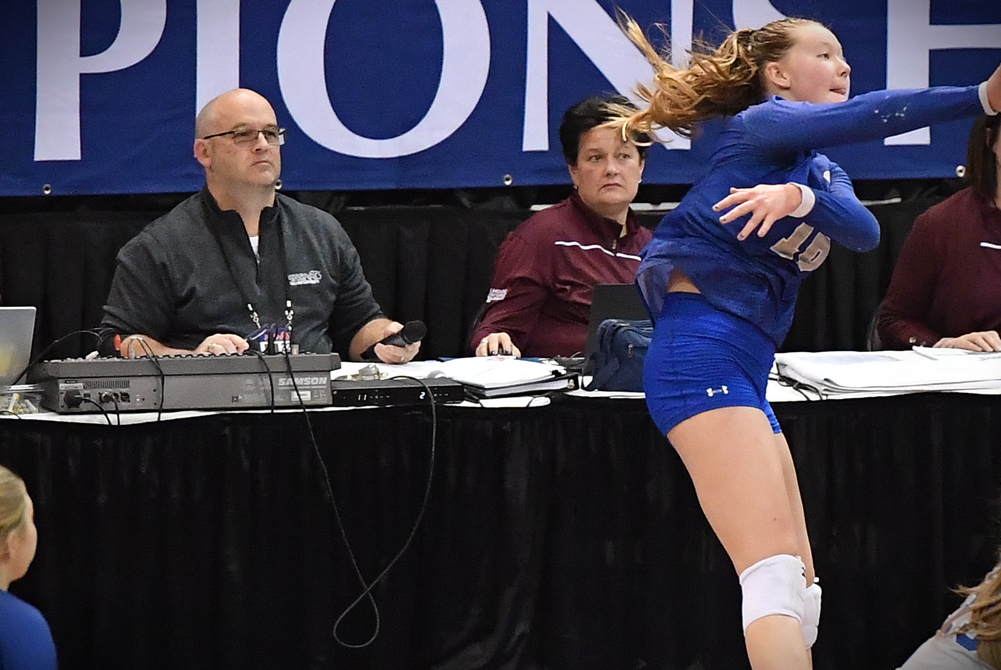
Thank Roosevelt for Football Weekends
December 20, 2013
By Rob Kaminski
MHSAA benchmarks editor
The next time you find yourself immersed in a tense crosstown football rivalry on a Friday night followed by a Saturday pilgrimage to the nearest college campus and a Sunday afternoon with a remote and your favorite snacks and beverages, take a moment to consider what the weekend would be like if it weren’t for Teddy Roosevelt.
The man who became our 26th President shortly after the turn of the 20th Century following the assassination of William McKinley in 1901 was a football fan like you. Maybe more so.
Today’s game of football has reached a critical crossroads. Player size and speed have increased across the board. Savage use of equipment as weapons rather than protective gear has been glorified on television networks and social media. Leaders of the game at all levels have recognized the need for change, employing new rules and widespread educational efforts to aid in preserving the sport.
History, as they say, is repeating itself.
In an ironic twist, it was Roosevelt who saved the then-brutally violent game of football from itself more than 100 years ago. Yes, the same “Rough and Ready Teddy” who led the charge up San Juan Hill during the Spanish-American War and often sparred in the boxing ring while in office from 1901-09 opined that football was becoming so gruesome that he delivered an ultimatum: clean up the game or it would be outlawed.
The Chicago Tribune reported that in 1904 alone, there were 18 football deaths and 159 serious injuries, mostly among prep school players. Football deaths suffered by younger players were reported on a nearly weekly basis, as outraged citizens called on colleges and high schools to banish football outright.
In stepped Roosevelt, who called head coaches and representatives from Harvard, Yale and Princeton – college powers at the time – to the White House in 1905 urging them to eliminate excessive violence and set an example of fair play for the rest of the country. When the casualties actually rose by one during the ensuing season, Roosevelt reacted with greater resolve and convened leading football authorities for the purpose of authoring drastic rules changes. What emerged was an intercollegiate conference which was the predecessor of the NCAA.
Among the most effective changes for the 1906 season were the legalization of the forward pass, the elimination of mass formations, and the creation of a neutral zone. Football fatalities fell to 11 in each of the next two seasons, and severe injuries fell drastically.
Thanks to the introduction of protective equipment and ever-evolving rules changes, football during the 100-plus years to follow has become an exponentially safer game. Yet, the game’s leaders always will need to adjust and react to scrutiny that comes with the territory.
So, as the game once again undergoes rules modifications in the name of safety, give a tip of the cap to President Roosevelt while you enjoy college bowl season and the NFL playoffs and begin to think ahead to the first high school practice of 2014.

In Memoriam: Tony Coggins (1971-2023)
By
Geoff Kimmerly
MHSAA.com senior editor
October 24, 2023
The MHSAA and Holly school communities are grieving this week after the sudden loss of Tony Coggins, a shining light in his educational community and an enthusiastic supporter of school sports as a public address announcer for several of our largest championship events.
But while that cheerful tone has been quieted, it surely will not be forgotten by the many fortunate to enjoy an event in the presence of that voice and the joyfulness he brought into every arena, press box and classroom.
Coggins, 51, died Saturday. He is survived by his wife Kristy and children Emma and Bradlee, among several family and friends from his local and greater sports communities.
 His career as a PA announcer began during his freshman year of high school in 1985, when his father Dale Coggins – Flushing’s athletic director at the time – couldn’t find anyone else to announce middle school football games. That was 39 years ago, and this fall Tony Coggins was in his 24th announcing at Holly, where he taught and served as an administrator in addition to his role as “Voice of the Holly Bronchos” for football, basketball, baseball, softball, volleyball, competitive cheer and swimming & diving over the years.
His career as a PA announcer began during his freshman year of high school in 1985, when his father Dale Coggins – Flushing’s athletic director at the time – couldn’t find anyone else to announce middle school football games. That was 39 years ago, and this fall Tony Coggins was in his 24th announcing at Holly, where he taught and served as an administrator in addition to his role as “Voice of the Holly Bronchos” for football, basketball, baseball, softball, volleyball, competitive cheer and swimming & diving over the years.
Coggins has been a mainstay among MHSAA Finals PA announcers over the last decade in football, basketball, softball and most recently volleyball. He lent his voice to college sports at University of Michigan as well. “Tony was a huge part of our Finals events. It’s hard to imagine it being the same without him,” MHSAA Executive Director Mark Uyl said.
As part of the run-up to the MHSAA public address announcers clinic in 2018, Coggins said this about what drew him to the microphone:
“I have zero athletic ability whatsoever, which is interesting because my father was an all-state running back. But I enjoy being involved, and I've always been the one for history and statistics and knowing what's going on,” Coggins said. “This is a way for me to be involved. It's a way for me to use a talent I've been given; public speaking has always come pretty naturally for me.
“So I worked at my craft to get better. I got better from watching the people around me, from studying the people I like, and the people – if I saw someone I didn’t care for – I'd make a note and say to myself, ‘Don't do that.’ I take feedback from people very personally, and I mean that in a good way. If somebody takes the time to come up and say, ‘You did this well; I think you should change this,’ that means they care about the program also. We all have the same goal in mind, and that's to make the experience good for the high school student and the parents, the fans, that come there.”
Funeral Mass will be celebrated at 11 a.m. Saturday, Oct. 28, at St. John Vianney, 2415 Bagley Street in Flint. There will be visitation from 2-8 p.m. Friday, Oct. 27, at the Swartz Funeral Home, 1225 West Hill Road, and at the church from 10 a.m. Saturday until the time of the Mass.
The Holly volleyball team played for something bigger tonight
Beloved PA announcer Anthony Coggins died on Friday night from a heart attack
Tonight v. Carman-Ainsworth, the Broncho community wore his favorite colors: maize & blue🟡🔵@HollyHighSchool|@BronchosAD
⬇️⬇️⬇️ pic.twitter.com/lPCRjjdmyL
— Brandon Green🍀 (@BGreenReports) October 24, 2023

